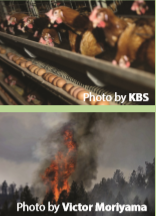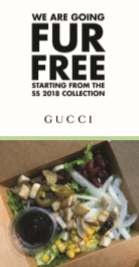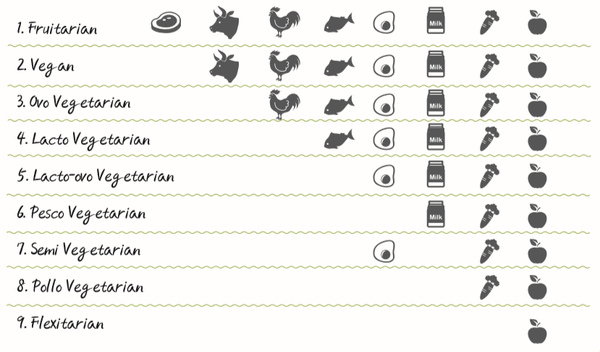/Culture/
Vegan, Beginning Movements in Society

Hong Sammy & Gu Seo-yoon Reporters
Veganism refers to a strict vegetarianism that avoids eating products of animals, such as meat, fish, eggs, and honey. Among some other recent issues, vegans are also known to concentrate on refusing the use of materials made from the animals, too. That includes clothing made from animal fur and products experimented on animals. Here, we introduce more about living a vegan lifestyle, that is frequently making the headline of daily news around the world.
Why Are You Vegan?

When you decide to lose weights, what kind of food will you buy at the supermarket? Maybe, green vegetables. Recently, eating vegetables to stay healthy and fit has increased. However, the reason vegans choose to be a vegan is not that simple. Then, what are the complicated reasons?
First, our environment. Korea’s 20th century industrialization has naturally created a dining culture, in which people eat out a lot. Meat appears at almost every meal. Food and Agriculture Organization of the United Nations (FAO) estimated that the world's population will grow to about 9.7 billion by 2050 and announced that people will consume 4.65 million tons of meat a year. This increase in meat consumption is having a large effect on our environment. For example, in Brazil, which ranked first in the world last year in exporting beef of 1.64 million tons, 65 percent of the Amazon's damaged areas are being used as rangeland. Water pollution, caused by livestock dung and insecticide, is also rampant in this rangeland. Not only is part of the Amazon forest being used as rangeland an issue, but water pollution is also serious. According to data released by the Ministry of Trade, Industry and Energy of Korea in 2015, 5,988 liters of water are used to produce 1 kilogram of pork. Seventy percent of the earth is composed of water. However, because of the salt content in ocean water, the actual fresh water available for human consumption is far more limited. In this case, the amount of water consumed by the ranching industry is enormous. Another problem is global warming. The UNFAO has said that greenhouse gases emitted by the livestock sector around the world account for 14.5 percent of the planet's total greenhouse gas emissions.
Did you know that chickens suffer a great deal while they are alive and being prepared to be our next meal? Chickens live about 33 days before they are slaughtered and sacrificed to become edible. Chickens must weigh 1.5 kilograms before they are killed; they are bred in very tight and uncomfortable spaces, covered with droppings, fed stale fodder -- and all this in the scorching summer heat of 30 degrees Celsius. Additionally, the chicken’s bones may not yet be fully developed at 33 days old, making it difficult for the chicken to walk steadily with a heavy body, which could actually break the leg bones. These kinds of chickens are not raised on poultry farms but bred under inhumane conditions in a factory.
Look for the Vegan trend in Daily Lives!

The Korea Vegetarian Union estimated the number of vegetarians in Korea at 1 to 1.5 million in 2018. It represents a tenfold increase within the 10-year period from 150,000 in 2008. With a growing number of vegans, we can now see vegetarian foods at convenience stores. In November, CU and 7-ELEVEN launched several products, including a lunch box, kimbap and a burger made suitable for vegetarian consumers. The vegan trend is not only visible in the area of food, but also in the field of fashion and cosmetics. For example, the London Fashion Week, one of the top four fashion weeks in the world, has excluded fur clothes from its runway since last year. Also, luxury brands such as Gucci, BURBERRY and JIMMY CHOO declared fur-free materials, using the fibers from some vegetables and fruits instead. In the cosmetics sector, sales of vegan cosmetics in South Korea jumped about 70% year on year in the January-September, according to the results of an own investigation by CJ Olive Young Corporation (health&beauty store).
Isn’t There So Many Types of Vegetarian?
To be a vegetarian or not is an individual’s choice. The best way to be a vegetarian is to set a period of time to test yourself, and select a type of vegetarianism that suits you and your lifestyle the best. You may be able to upgrade to a stricter type of vegetarian diet after some time if you wish. Becoming a vegetarian is usually a gradual process, during which time the body needs to adjust to not having certain nutrients that are primarily obtained from animals. Here are descriptions for each type of vegetarian.

Fruitarian
Vegan
Ovo Vegetarian
Lacto Vegetarian
Lacto-ovo Vegetarian
Pesco Vegetarian
Semi Vegetarian
Pollo Vegetarian
Flexitarian
* Fruitarian – The radical vegetarian that cherishes the rights of plants as well. They eat only ripened fruits that have dropped onto the ground.
* Vegan – The complete vegetarian. They eat nothing of the animal and fish. Only the 100% vegetable food is acceptable. Using materials made of silk or leather produced from animals is banned.
* Lacto Vegetarian – They ban meat, fish, and animals’ eggs. Food produced without harming the animals, such as dairy products (milk, butter, cheese, cream), and honey, are possible.
* Lacto-ovo Vegetarian – Type of vegetarian that oppose the slaughtering of animals. They eat other than meat and fish.
* Flexitarian – Normally, they live on vegetables, but sometimes eat meat depending on circumstances.
Not All Vegans Become Healthy

Veganism is usually considered healthy, since it is known that one can avoid diabetes, and heart diseases. Moreover, it may be easier to control one’s weight by eating vegetables. However, some health problems, like anemia and indigestion, have recently arisen among vegans. These often result from a nutrient imbalance, such as not having enough vitamin B12- a necessary nutrient found only in animals, not in vegetables. Moreover, as nutritionist Samantha Heller has said, “vegans need to be mindful of obtaining certain nutrients, such as vitamin B12, Vitamin D, and Omega-3 fatty acids.” Additionally, according to the Oxford Public Health research team, vegans were at a 20% higher risk for cerebral stroke than those who eat meat and fish.
As seen above, a vegan lifestyle does not just come from the simple question of beauty care product testing on animals and losing weights. Rather, many vegans are more conscious about social issues, such as the environment, the vicious cycle of the wealthy and the poor, animal rights, and many more. It is time that we think about why people are becoming vegan, and depend on our own judgments and principles. One thing to remember is that veganism is not just an action of an individual, but that one person’s decision makes an impact on the global society, as well.

